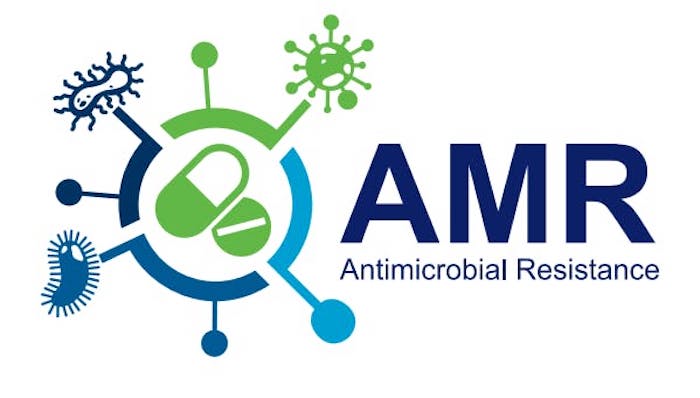
This article was written by Lydia Aganin, an Undergraduate Law student at the University of Uyo, Nigeria, and the first runner-up of OHDI’s Combating Superbugs Essay Competition.
INTRODUCTION
Antimicrobial resistance (AMR) is a significant threat to global health, particularly in Nigeria, where it causes more fatalities than respiratory infections, tropical illnesses, and cardiovascular conditions combined. AMR occurs when an antibiotic agent that is ordinarily active against susceptible microorganisms stops working.1 As a result, antimicrobial medications used to prevent and treat infectious diseases in humans, animals, and plants, lose their effectiveness, and treating infections becomes challenging or impossible. This raises the risk of infection spread, serious illness, and death. In 2019, AMR was directly responsible for 263,400 deaths in Nigeria, out of 64,500 attributable deaths overall.2 Additionally, four of the fifteen priority antimicrobial pathogens identified by the World Health Organisation (WHO) have been found in Nigeria.3 This pressing concern – AMR – demands interdisciplinary solutions. Consequently, this essay aims to address the pressing issue of AMR and propose innovative ways for undergraduates, particularly in the realm of Law, to fortify the arsenal against AMR.
The Role of Undergraduates in Combating Antimicrobial Resistance
In universities around the globe, students, particularly undergraduates, are driving ground-breaking research to tackle global challenges. As future leaders and professionals in various fields, they possess a fresh perspective and an eagerness to explore uncharted territories which are key drivers in discovering novel solutions. The fight against antimicrobial resistance is not exempted in this regard. Undergraduates have an innovative role to play in combating superbugs.
One innovative way undergraduates can contribute to combating superbugs is by actively participating in public health initiatives focused on antimicrobial resistance.4 For instance, by engaging in educational campaigns to raise awareness about the dangers of antibiotic misuse and advocating for proper antibiotic use. Notably, the inappropriate use of antibiotics is a major factor associated with the expansion of AMR. In Nigeria, about 46.7 to 71.1% of children aged five years were given antibiotics without prescription in 2017, while only 68.3% of adults used antibiotics following the doctor’s prescription.5 This underscores the importance of raising awareness about AMR and the dangers of antibiotic misuse, especially given the significant lack of awareness in Nigeria. By educating the public on the appropriate use of antibiotics, including the importance of completing the prescribed course and avoiding unnecessary usage, we can significantly reduce the development of drug-resistant bacteria.
Evidently, an innovative solution to combat antimicrobial resistance and reduce the threat of superbugs is by promoting education and awareness. This aligns with the first objective of the WHO Action Plan on Antimicrobial Resistance which is the need to “[i] mprove awareness and understanding of antimicrobial resistance through effective communication, education and training.”6 As undergraduates, we often take the lead in peer-to-peer education and participate in awareness campaigns within our academic communities. In this era of digital prominence, our outreach extends seamlessly to a broader audience through the strategic use of social media and influential partnerships. Armed with knowledge and a sense of responsibility, undergraduates can empower not just fellow students, but the wider society to make informed choices regarding antibiotic use. By contributing to nurturing a culture of responsible antibiotic use, we not only benefit our campus community but also send out a positive ripple effect that touches and improves society at large.
Additionally, undergraduates play an innovative role in the fight against AMR by fostering collaboration across diverse disciplines. We can create a powerful synergy to address the multifaceted challenges posed by AMR by forming interdisciplinary teams that include students and professionals from fields like medicine, journalism, law, etc. These teams can work on research projects, policy advocacy, and educational initiatives to promote mitigation of superbugs in various settings. Interdisciplinary research also helps to identify and address the complex social, economic, and legal factors that contribute to the spread of antimicrobial resistance. Through interdisciplinary dialogue and partnership, undergraduates can contribute innovative and holistic solutions to combat superbugs. These superbugs are bacteria that have developed resistance to multiple antibiotics, making them difficult to treat and control.
Law and Antimicrobial Resistance: A New Perspective
The rise of superbugs poses a critical threat to global health that demands urgent and innovative solutions. While various disciplines contribute to the fight against AMR, this essay focuses on the pivotal role of Laws. Laws can be used to develop and implement comprehensive regulations for the appropriate use of antibiotics in various sectors such as healthcare, agriculture, and veterinary medicine.7 There is a need for effective laws and regulations to address antimicrobial resistance. This could include measures such as restrictions on over-the-counter sales of antibiotics and penalties for inappropriate or excessive use of antibiotics. Legal frameworks can enforce strict controls on antibiotic use, preventing over-prescription and agricultural overuse.
Law can contribute to effectively combat antimicrobial resistance and reduce the threat of superbugs by establishing regulatory bodies in Nigeria to monitor and enforce antibiotic use. These bodies would be responsible for implementing and enforcing strict guidelines and regulations on the appropriate use of antibiotics, ensuring that healthcare providers and individuals adhere to proper prescribing practices. By closely monitoring the use of antibiotics, these regulatory bodies would be able to identify patterns of misuse or overuse, educate healthcare professionals on the importance of responsible antibiotic use, and take necessary actions against violators.
Furthermore, Law can support and incentivize research and development of new antimicrobials by providing funding, grants, and tax incentives to pharmaceutical companies and researchers working on developing new antibiotics. This is in addition to incorporating measures that encourage the research and development of new antibiotics, incentivizing pharmaceutical companies to invest in the development of much-needed solutions. Such regulatory frameworks would require collaboration between legal experts, policymakers, and relevant stakeholders to ensure their effectiveness and feasibility.
In addition, Laws can address the issue of access to antimicrobials by creating policies that ensure affordable and equitable distribution of antimicrobials, especially in resource-limited settings. Ensuring access to affordable and effective antibiotics is very important in the fight against AMR. Although many old antibiotics are still effective, their small market size does not provide financial incentives for pharmaceutical companies to manufacture and distribute them, which highlights the need for Law to establish new procurement models that will address these incentives.8 For example, Thailand developed policies to help incentivize appropriate antimicrobial use, most notably through its Antibiotics Smart Use (ASU) programme.9
To effectively combat antimicrobial resistance and reduce the threat of superbugs in the future, it is beneficial for law schools to incorporate this topic in their curriculum. Incorporating courses on medical law and public health policy in the legal curriculum would provide students with an understanding of the legal frameworks surrounding the use and distribution of antibiotics. By emphasizing the need for law schools to address antimicrobial resistance, future legal professionals will gain a comprehensive understanding of the legal framework required to regulate and monitor the use of antibiotics, develop policies to incentivize research and development of new antibiotics, and advocate for effective public health measures. This integrated approach will ensure that legal professionals are equipped with the knowledge and skills to contribute to global efforts in combating antimicrobial resistance.
CONCLUSION
Laws play pivotal roles in ensuring that antimicrobial medications are used responsibly, promoting the appropriate prescription and dispensing practices, and regulating their sale and distribution. It establishes guidelines for the appropriate use of antibiotics, restricts the over-the-counter availability of these drugs, and promotes surveillance systems to monitor their usage. By enforcing regulations, laws acts as a safeguard against the misuse and overuse of antibiotics, thus reducing the potential for antimicrobial resistance and the emergence of superbugs.
References
1 C. O. Iheanacho, U. I. Eze, ‘Antimicrobial resistance in Nigeria: Challenges and charting the way forward. ‘ (2021) European Journal of Hospital Pharmacy, Vol. 29 Issue 2. Available at: http://dx.doi.org/10.1136/ejhpharm-2021-002762
2 ‘The burden of antimicrobial resistance (AMR) in Nigeria.’ (2023) University of Washington, Oxford University Press. Available at: http://academic.oup.com/ofid/article/6/Supplement_2/S679/5604416
3 Nigeria Centre for Disease Control and Prevention, ‘Nigeria joins the global community to commemorate World Antimicrobial Awareness Week (WAAW)’ (2023). Available at: https://www.ncdc.gov.ng/news/ie0a/ntptu.asp
4 D. O. Parades, S. D. Jason, M. L. Alvarez, ‘Antibiotic resistance Awareness among Undergraduate Students in Quito, Ecuador.’ (2022) National Library of Medicine. 11(2) 97.
5 National Action Plan for Antimicrobial Resistance 2017-2022. Federal Ministries of Agriculture, Environment and Health.
6 World Health Organization Global action plan on Antimicrobial resistance; 2015. http://apps.who.int/iris/bitstream/10665/193736/1/9789241509763_eng.pdf. Accessed 30 November 2023.
7 Alexandre Ming, Jacob Puddle, Henry Wilson, ‘Antimicrobial Resistance: The Role of Regulation’ (2019)
Global Governance Institute.
8 Pulcini, C. et al (2017) ‘Ensuring universal access to old antibiotics: a critical but neglected priority. ‘ Clinical Microbiology and Infection, 23(9), pp. 590-592.
9 Supremacist, N. et al (2012). ‘Antibiotics Smart Use: a workable model for promoting the rationale use of medicines in Thailand.’ Bulletin of the World Health Organization, 90(12), pp. 905-913.





